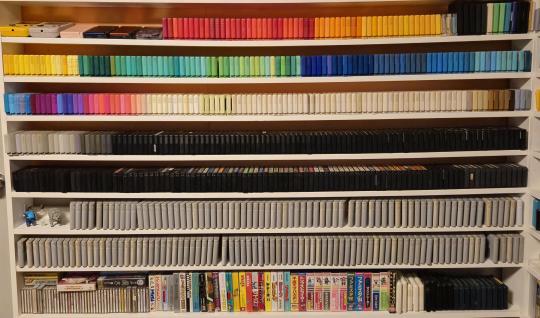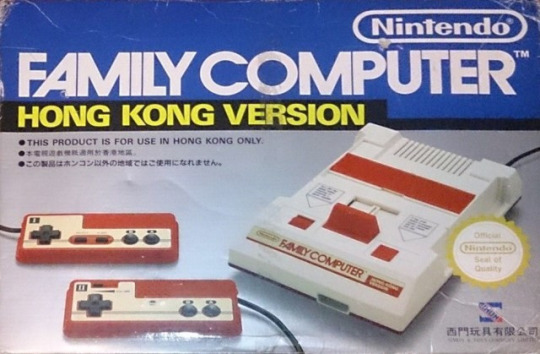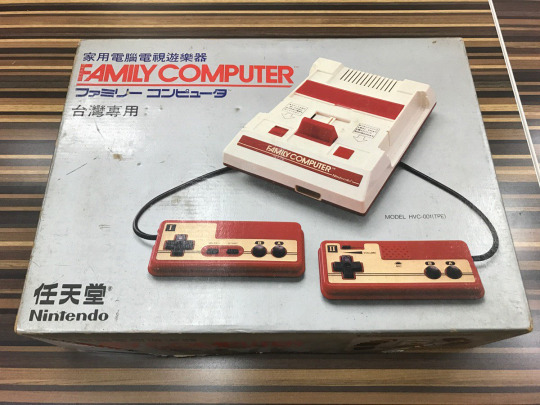#famiwiki
Explore tagged Tumblr posts
Text
FamiWiki - What, why, how?
Hello! It's been a while since I've last posted to Tumblr, but rest assured I have not forgotten about this place. I just haven't had anything interesting to post that would fit here. But let's not dwell on my absence for long, cause I want to talk about a project I've been working on for over 2 years as of writing, FamiWiki.
What is FamiWiki?
FamiWiki (famiwiki.net) is a wiki site that primary covers the Famicom in a Japanese first context. You're probably already familiar what a wiki site already is if you've been on the internet for long enough. For those who don't know what "Famicom" is, it is an abbreviation of Family Computer, which is the name of a home video game console Nintendo released on July 15, 1983 in Japan. You'll likely be familiar with the Nintendo Entertainment System, or NES which is a rebranding and redesigned version of the Famicom that released two years later outside of Japan. But why "Japanese first context"? Part of this has to do with primarily covering Japanese material but also it is what makes FamiWiki unique from all other English-based wiki sites on the internet as even when covering Japanese material, it is usually written with the assumption that the western perspective takes priority including things that have never officially released outside of the country.

Why FamiWiki?
I started getting into collecting Japanese video games in the 2020s. I not only got hooked on the "cheap" prices but also the opportunity to learn something completely new from the games I was importing. Something that has always rubbed me the wrong way is how collecting older video games tends to be done for the sake of nostalgia, which is something I never fully agreed with. Sure it's a factor at play and for some a very important one that got them into this hobby but that said, it shouldn't be seen as the only way people can get into this stuff. I got into older video games for the sake of learning about them and being able to sit back and play a relatively simple game compared to modern offerings is a nice bonus. It also helped that this in a way let me engaged with the past since I was born in 2002 and didn't get to experience what it was like back decades ago so older video games are in a way tools to allow me to experience what it was like back then to a certain degree.

Anyways as for why this site exists, long story short I got a bit fed up with how people were covering Japanese video games as it was almost always within the western perspective. That said however, my searching would lead me to discovering a relatively unknown YouTube channel at the time under the name RndStranger. At the time when I discovered their channel, they were still uploading daily videos covering Famicom cartridge software in the Famidaily web series. Needless to say, I have a lot of respect for his work because he gives a spotlight to a particular Japanese game for however many minutes and goes over the context, reviews, and reception all within a Japanese perspective. His videos really opened my eyes to how much we were missing out when not discussing or even mentioning these details elsewhere on the English internet which alongside a few other dominoes that fell, led me to the idea for a Famicom-based wiki site with a Japanese first perspective.
How is FamiWiki?
FamiWiki went online in March 2023. As of the time I am writing this, there are 1,712 content pages, 5,809 pages overall, 2,569 uploaded files, and a total of 25,708 page edits with a 4.43 edits per page average. The site is hosted by The OpenWiki Project who also hosts other wiki sites such as Fire Emblem Wiki, Hard Drop, and WiKirby to name a few.

Currently, FamiWiki has pages for every single commercially released Famicom cartridge software from 1983 to 1994. Now granted the vast majority of those pages are still blank, with a few that are properly covered. Here are a few examples of what to expect from polished software pages.
Gimmick!
Nuts & Milk
Super Mario Bros.
Speaking of which, one of the biggest accomplishments the wiki site has achieved is featuring what I believe to be the most accurate list of Famicom software on the English internet.
List of Family Computer software
English Wikipedia actually used to have its own list of "Famicom games" but then merged it into the "NES games" list. But even so, it seems that Wikipedia list doesn't account for the weird edge cases of certain software not technically being for Famicom. What do I mean by this? There are certain releases that came on smaller cartridges that would need to be plugged into an adapter cartridge which is what actually plugs into the console. So things like the Datach Joint ROM System library often gets mistakenly included when really it should be separate. What makes the FamiWiki list different is that we define what media type is covered. The main list comprises of software that was commercially released on 60-pin Famicom cartridges. There are certain releases that did release on 60-pin cartridges but not to stores so those do not count towards the main list. The same goes for prize cartridges as well. Currently, the count on FamiWiki is 1041 60-pin Famicom cartridge software. Eventually I'd like to get around to making a similarly detailed list for NES cartridge software.
"Wait, NES? I thought you were only covering the Famicom!"
Truth is, the scope for FamiWiki actually goes further than the Famicom. It's actually both the Famicom and Super Famicom, but a more accurate description would be 8-bit Nintendo and 16-bit Nintendo coverage from all regions, but with Japan being priority. It didn't feel right to not include the NES and SNES since having that coverage would provide context for the Famicom and Super Famicom coverage as well. So even if you aren't into specifically Japanese games, you'll probably find something in FamiWiki in the future that will be of your interest in some way. There is a LOT to cover just from Nintendo's 8-bit and 16-bit home console history and I've pretty much been the sole major contributor to the site since it first went online over 2 years ago. I would very much like to get help from others especially in areas that I am not familiar with. It's also embarrassing to admit that despite running a site covering the Japanese perspective... my Japanese is pretty poor at the moment. I have been slowly learning since the site went up and I plan on being "fluent" enough to be able to better contribute in the coming years.
Until then, if any of this sounds remotely interesting to you please consider registering an account and contribute to the wiki site just a little bit. Any edits big or small would really help out. There are a couple of updates to the site that I am currently working on and hope to roll out soon but hopefully within the next few years we will have more coverage on these Japanese games than we did back when the internet was in its infancy.
To end things, here is one of my personal favorite pages on the entire site.
Family Computer cartridge variations
3 notes
·
View notes
Text
FamiWiki - Addressing the Console Paradox
Recently I opened a new wiki titled FamiWiki with the current focus being the documentation of the Famicom software library, hardware, add-ons, and accessories.

The wiki was created for various reasons but one of the factors that led me into pursuing the creation of FamiWiki was my distaste of Famicom neglect on the English side of the internet. For many years it has collectively been decided by most western users that the Famicom is simply a regional variant of the NES. On paper this is fine, and mind you the lack of documentation of the Famicom is what most likely resulted in the acceptance of this belief. Especially back in the 2000s when hardly anyone outside of Japan knew what a Famicom is. Things have changed a lot within the past 2 decades though and at this point we should really start questioning our prior beliefs we had. Most who are into retro games know what a Famicom is, they probably couldn't tell you anything specific about the Famicom but they'd at least recognize it. FamiWiki aims to have proper documentation of the Famicom but most importantly draw the line between the Famicom and NES.

I made a post several months back about the console paradox. In the post I explained that folks tend to mix the terms console and platform as one thing, when in reality they are distinct terms. On FamiWiki we currently have the following definitions.
Console - A computer designed to play software made for it.
Platform - An ecosystem that encompasses the software designed for specific consoles.
It's more or less the same definitions given within that previous post, but now applied to FamiWiki. The result? We've been able to properly draw the lines between different consoles and platforms while also giving a name for everything in general.

This system we have in place is also very flexible when we need to include other oddities such as actual regional variants and other add-ons. We've been able to create something that's less confusing and makes more sense than what other wikis and websites currently have in place. The acceptance of this however is going to take a while to sink in but I'd imagine when FamiWiki becomes a useful resource for many to reference than that's when things are most likely to change and hopefully inspire the same change elsewhere.
Anyways stop calling the Famicom a Japanese NES when the Famicom actually released officially outside of Japan thus not making it Japanese exclusive.


2 notes
·
View notes